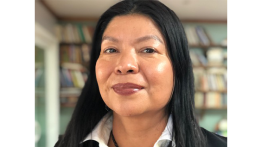Gloria Elizabeth Chacón, "Mayan Precolonial marks and Worldmaking in Contemporary Artistic Expression"
Tuesday, November 9, 2021, 7 - 8:30pm

As part of the Fall 2021 Intra-Disciplinary Seminar series, Gloria Elizabeth Chacón gives a free online talk that focuses on Kab’awil, a key Maya concept, that emerges in a pre-colonial era and evolves across space and time. She will discuss its relevance in thinking about contemporary Mayan cultural expressions. The discussion will offer some historical and cultural context and concentrate on how it manifests in today’s contemporary works. She argues that this analytic allows indigenous cultural producers to carve out a new conceptual, literary, cultural, political, and social space. In particular, the talk concentrates on how it operates in a play by Mayan women.
Gloria Elizabeth Chacón is associate professor in the Literature Department at the University of California, San Diego. She is the author of Indigenous Cosmolectics: Kab’awil and the Making of Maya and Zapotec Literatures (2018) and coeditor of Indigenous Interfaces: Spaces, Technology, and Social Networks in Mexico and Central America (2019). She also co-edited a special issue on Indigenous Literatures for Diálogo, DePaul University (2016). Her scholarly articles have been published in Canada, Colombia, Mexico, Germany, and Spain. She is currently working on a coedited anthology, tentatively titled “Tearing Down Disciplinary Barriers: Dialogues between Hispanic and Indigenous Studies,” and her second book, preliminarily titled “Metamestizaje, Indigeneity and Diasporas in the South-South.”
The IDS public lecture series is part of the Robert Lehman Visiting Artist Program at The Cooper Union. We are grateful for major funding from the Robert Lehman Foundation. The IDS public lecture series is also made possible by generous support from the Open Society Foundations.




